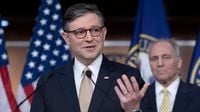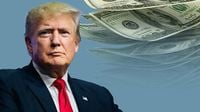In the ongoing debate over tax policy, former top aide to ex-Vice President Mike Pence, Marc Short, has voiced strong opposition to the idea of raising taxes on wealthy Americans. Short, who played a pivotal role in the negotiations for President Donald Trump’s 2017 Tax Cuts and Jobs Act (TCJA), emphasized that such a move is counterproductive and detrimental to small businesses across the country.
Speaking to Fox News Digital, Short stated, "Raising taxes on America's highest earners and biggest job creators makes no sense. I don't understand why there are some inside the current administration who are pushing Congress to raise the top rate, because again, these are America's job creators." He further elaborated that many small businesses file taxes as individuals, meaning an increase in taxes would directly impact them.
The backdrop of this discussion is a significant piece of legislation that congressional Republicans are currently crafting, which Trump has dubbed his "big, beautiful bill." This legislation aims to advance Trump's policies across various sectors, including tax reform, border security, immigration, energy, defense, and addressing the national debt. Notably, the tax policy component is expected to be the most expensive aspect of this legislation, with House negotiators tasked with identifying cuts totaling at least $1.5 trillion to offset new spending.
A source close to Trump revealed that the former president is contemplating a reversion of the tax rate for individuals earning $2.5 million or more from the current 37% back to the pre-2017 rate of 39.6%. This adjustment is seen as a means to fund substantial tax cuts for middle- and working-class Americans while also safeguarding programs like Medicaid.
However, Short is skeptical about these new priorities, dismissing them as mere political gimmicks. He remarked, "I feel like some of the administration's new requirements are somewhat gimmicky. I'm not sure many Americans who earn their income based on tips are even paying taxes on those tips right now. And I think we should begin to extend that to say no tax on overtime." He expressed concern that such changes would create additional compliance hurdles for businesses.
Short also critiqued the notion of eliminating taxes on Social Security, arguing that it contradicts the goal established during the TCJA to simplify the tax code and create a fairer system for all Americans. He stated, "We tried to simplify the tax code, make it flatter and fair for all Americans, as opposed to creating carve-outs for certain constituencies."
In tandem with Short's comments, former Vice President Mike Pence has also urged Trump to reconsider any plans to increase taxes on the wealthy. Pence, known for his fiscal conservatism, warned that raising the tax rate on high earners would result in "an enormous tax increase on small business America." He cautioned that the majority of individuals filing taxes at the million-dollar mark are small business owners who reinvest their earnings back into their companies.
Pence’s concerns were articulated during an interview with Fox News Digital, where he noted, "Any suggestion that I've heard among some in and around the administration that we raise the top margin rate, the so-called millionaires tax, would be an enormous tax increase on small business owners across America. It needs to be opposed."
Moreover, Pence emphasized the importance of making the Trump-Pence tax cuts permanent, suggesting that this would lay a solid foundation for future economic growth. He praised Trump for his previous successes, including securing the southern border and revitalizing military recruitment, while expressing his concerns about straying from conservative principles.
Pence remarked, "I truly do believe that some of the other steps the president is taking away from that conservative agenda should be a concern that would work against his legacy and ultimately the success of our party or our country." He reiterated the need for the United States to adhere to time-honored principles, including strong defense, less government, and lower taxes.
As the Trump administration navigates these complex negotiations, the voices of Short and Pence reflect a broader unease among some conservatives regarding potential tax increases. Richard Stern, director of the Hermann Center for the Federal Budget at the Heritage Foundation, echoed these sentiments, stating that raising tax rates to 40% or higher would be counterproductive. He argued, "Congress needs to get its fiscal house in order, but it must do so by tightening its own belt, not by forcing American taxpayers to tighten theirs. A higher top tax rate would be counterproductive, discouraging hard work and entrepreneurship."
Brent Gardner, chief government affairs officer at Americans for Prosperity, also chimed in, asserting that raising taxes on any American should be completely off the table. His comments highlight a growing consensus among conservative groups that any tax increase could stifle economic growth and hurt small businesses.
As the deadline approaches for the expiration of the TCJA, the Trump administration faces mounting pressure to finalize its tax policy. With both Short and Pence advocating for the preservation of existing tax cuts, the outcome of these negotiations will likely have significant implications for the American economy and the Republican Party's platform moving forward.
In the coming weeks, as discussions continue, it remains to be seen whether the administration will heed the warnings from its former officials or pursue a path that could reshape the tax landscape in ways that some believe could hinder economic recovery.





